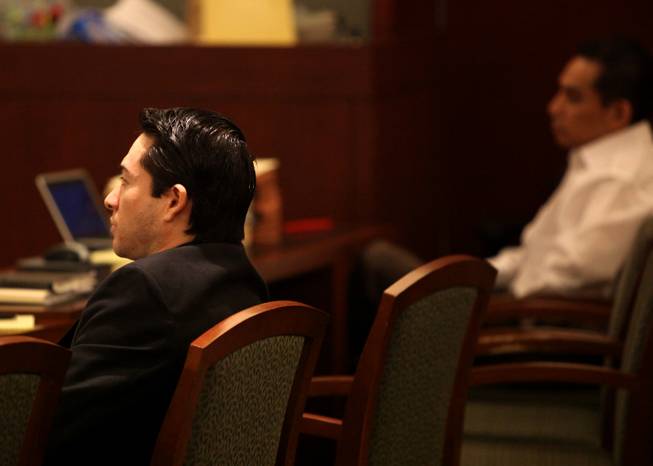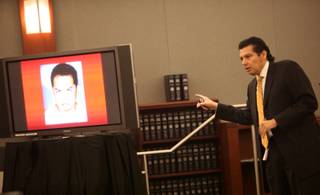
Porfirio Duarte-Hererra (left) and Omar Rueda-Denvers are charged with placing a bomb in a coffee cup and putting it on the truck of Willebaldo Dorantes Antonio, killing him on May 7, 2007.
Friday, Aug. 21, 2009 | 1:50 p.m.
Sun Archives
Testimony has begun in the death penalty trial of two men charged in a fatal bombing at a Las Vegas Strip resort in 2007.
Luxor security guard Scott Casey testified he was in the parking garage of the hotel-casino when he heard a "loud boom" and felt vibrations from the level above him on May 7, 2007, the night 24-year-old Willebaldo Dorantes Antonio, a Nathan's Hotdogs employee, was killed by a bomb.
Porfirio Duarte-Herrera and Omar Rueda-Denvers have pleaded not guilty to charges of attempted murder with use of a deadly weapon, malicious destruction of private property, possession of an explosive or incendiary device during the commission of a felony, murder with use of a deadly weapon, manufacture and/or possession of an explosive or incendiary device and possession of a component of an explosive device.
Prosecutors allege Duarte-Herrera built a pipe bomb that killed Dorantes Antonio because the man was dating Rueda-Denvers' ex-girlfriend.
In opening statements Friday in Clark County District Court, prosecutors played surveillance video to illustrate for the jury how they say the events transpired. Deputy District Attorney David Stanton narrated as a car he said was driven by Rueda-Denvers, with Duarte-Herrera as a passenger, drove to the top of the parking garage. Stanton said the men were searching for Dorantes Antonio's vehicle. The men later returned to place the bomb on the roof of Dorantes Antonio's car, on the driver's side, he said.
As the couple reached the car, Dorantes Antonio went to the driver's side while Caren Chali, Dorantes Antonio's girlfriend, went to the passenger's side. Before he opened the door, he moved a Styrofoam coffee cup sitting on the roof, prosecutors said.
As he moved the cup, a motion-activated homemade pipe bomb inside detonated. Dorantes Antonio died from a piece of metal that lodged in his brain. His right hand was blown off. Chali wasn't injured.
"It was an extremely powerful bomb ... designed for one sole purpose, and that was to kill," Stanton told the jury.
As Stanton explained the events to the jury of 13 women and one man, including two alternates, he held a coffee cup in his hand. As he told them how the bomb was disguised, he pointed out that they probably hadn't noticed he had picked up the cup because it was such a common object.
That's a notion Rueda-Denvers' attorney, Christopher Orem, latched onto as well.
He said his client told police that he and Duarte-Herrera had been watching Dorantes Antonio's vehicle at the Luxor, and although he had told police that Duarte-Herrera had at one point exited the vehicle, he didn't know the other man had a bomb. He never noticed a coffee cup, Orem said.
Rueda-Denvers told police he was "obsessed" with Chali and had been following her to and from work, Stanton said. Orem said Rueda-Denvers had been trailing Chali in an effort to locate his daughter, who he hadn't seen in months.
Stanton called Chali "a key eyewitness." She had previously given a videotaped deposition that will be presented to the jury. Stanton said she had since faced deportation proceedings and is unable to testify in-person.
Both defendants have given detailed statements to police about the night Dorantes Antonio was killed. Although the men are being tried together, the jury will reach independent verdicts as to each man's guilt or innocence.
Charles Cano, a deputy special public defender representing Duarte-Herrera, claims Rueda-Denvers is the only person charged in the case who has a motive.
"This case revolves around one man -- Omar Rueda-Denvers," he told the jury in his opening statements.
He pointed out that the true identity of Rueda-Denvers is still unclear, and he has at least five aliases. Chali has told police that the two met in their native Guatemala, where they had a child and he was known to her as Alexander Perez. She told police she followed him to Panama, where they worked in a cleaning business for a businessman named "Omar Rueda-Denvers."
After coming to the United States, he became known to others by that name, Cano said.
Rueda-Denvers had called off the relationship 15 days after she followed him to the United States because of a new woman in his life, Chali told police.
Testimony is expected to continue through next week.


Join the Discussion:
Check this out for a full explanation of our conversion to the LiveFyre commenting system and instructions on how to sign up for an account.
Full comments policy